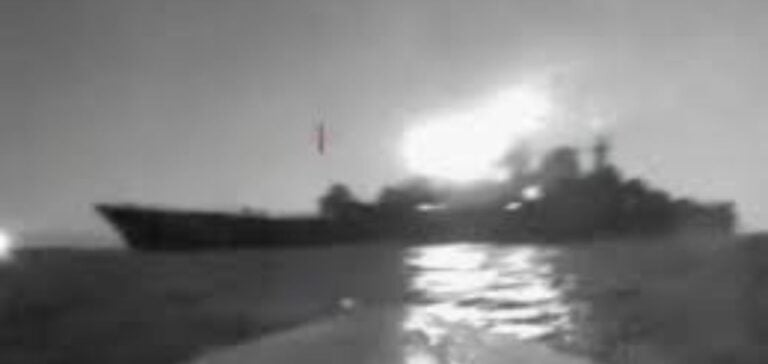A Ukrainian drone hit a Russian oil tanker in the Kerch Strait on Friday night, briefly interrupting traffic on the strategic bridge linking Crimea to Russia, amid growing tensions in the Black Sea.
Escalating tensions in the Black Sea: Russian tanker targeted by Ukrainian drone strike
A Ukrainian drone had hit a Russian warship earlier on Friday at a base in the Black Sea. The number of attacks in the Black Sea has increased on both sides since Moscow refused in mid-July to renew a UN-brokered agreement that allowed Ukrainian grain exports across the Black Sea despite Russia’s war in Ukraine since February 2022.
“During the night, the SBU blew up the +SIG+, a major Russian Federation tanker carrying fuel for Russian soldiers,” a source in the Ukrainian security services confirmed to AFP on Saturday, describing the vessel as “one of Russia’s main oil tankers”.
They successfully carried out this new “special operation” in coordination with the Navy in Ukrainian territorial waters using a naval drone and explosives, she added, insisting:
“It was well loaded with fuel so the fireworks were visible from a distance”.
Russian tanker hit in Kerch Strait, disrupting traffic to Crimea
This source confirms the attack previously reported by the Russian Federal Maritime and River Transport Agency on Telegram and the Russian news agency RIA Novosti, specifying that there were no casualties. According to the maritime agency, a drone hit the Russian tanker SIG at around 23:20 (20:20 GMT) south of the Kerch Strait. It suffered a hole in the waterline in the engine room area, “probably as a result of a naval drone attack”.
“The ship is afloat” and preparations are underway to repair the damage, she added. The Marine Traffic website showed the vessel stationary, assisted by tugs, in the southern part of the strait. The ship is under US sanctions for supplying kerosene to Russian forces during the war in Syria.
According to the Russian Highway Information Center, they suspended traffic on the bridge linking the Crimean peninsula, annexed by Moscow in 2014, to Russia for three hours before resuming it early Saturday. The bridge is used to transport supplies to the Russian military on the Ukrainian front.
Another Ukrainian drone strike targets a Russian warship in Novorossiysk
Earlier on Friday, a Ukrainian drone strike targeted a Russian warship, the Olenegrorski Gorniak, at a Black Sea base in Novorossiysk (southwest Russia). In a video obtained by AFP, a naval drone is first seen racing towards the darkened silhouette of a boat, before the connection is abruptly cut off. On Friday, a source in the Ukrainian security services (SBU) told AFP that the operation had been “successful”, adding that “the aim was to show that Ukraine could attack any Russian warship in this area.”
Russia claimed to have repelled a Ukrainian attempt involving “two unmanned boats” against this base. The Ministry of Defense announced in a statement that it had visually detected and destroyed the naval drones using fire from Russian ships. They destroyed 13 unmanned aircraft over Crimea, without reporting any casualties or damage.
“A new Russian ship is about to sink,” the Ukrainian Foreign Ministry commented on social networks, alongside a video showing a vessel tilting heavily to one side.
Black Sea: Ukrainian drones redefine the attack equation, Russian fleet targeted
This was the first attack of its kind on Novorossiysk, a major oil port and terminus of a 1,500 km oil pipeline from the oil fields of western Kazakhstan to the Russian regions north of the Caspian Sea. Most of Kazakhstan’s oil exports pass through here. The Caspian Pipeline Consortium (CPC), in charge of the pipeline, reported that there was no damage and that oil continued to flow normally aboard tankers docked in the port, after a brief ban on movement in the area.
Attacks have multiplied recently against the Russian Black Sea fleet, whose main base is at Sevastopol in Crimea, and which has already been targeted several times since the start of the war. On Tuesday, Russia claimed to have foiled a strike by three Ukrainian naval drones against patrol boats 340 kilometers southwest of Sevastopol. A similar operation had taken place a week earlier.
“What’s happening in the Black Sea? Drones are changing the rules of the game,” commented Mykhaïlo Podolyak, an adviser to the Ukrainian presidency, on X (formerly Twitter) on Friday, adding that they made it possible to “destroy the value of the Russian fleet”.
Conflict in Ukraine: Kiev persists in its counter-offensive, the Russian Defense Minister visits the Lyman zone
At the beginning of June, Kiev launched a counter-offensive to retake the territories conquered by Moscow, with modest progress to date. It also proclaims its intention to recover Crimea. Ukraine has warned that its current counter-offensive could last a long time, and urged its allies to send more weapons.
Russian Defense Minister Sergei Shoigu visited the area of the military operation in Ukraine to inspect a command post. He held talks with high-ranking officers, Moscow reported on Friday. Mr. Choïgou was presented with a report on the current situation on the front and “thanked the commanders and (other) servicemen (…) for successful offensive actions” in the Lyman area of eastern Ukraine, the Russian army said in a statement, without specifying when the trip took place.






















